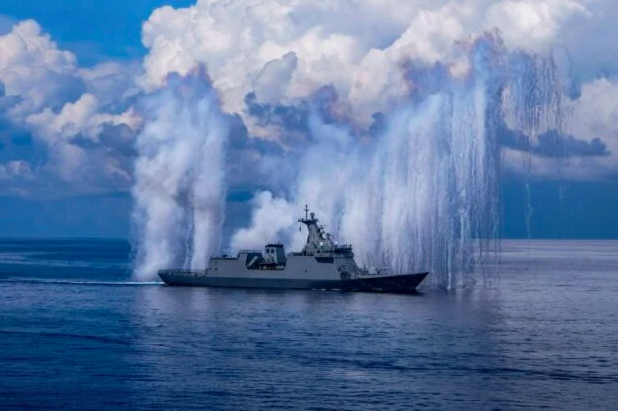
Philippine navy ship BRP Antonio Luna (FF-151) launches bullfighter chaff decoys during a navy’s capability demonstration, witnessed by Philippine President Ferdinand Marcos Jr. (not pictured) aboard the Philippine navy ship BRP Davao del Sur, a Tarlac-class landing platform dock, off Zambales, facing the South China Sea on May 19, 2023. (Photo by YUMMIE DINGDING / POOL / AFP)
President Marcos on Friday witnessed the practice firing of a short-range defensive missile from onboard the BRP Davao Del Sur off San Antonio town in Zambales, the province facing the disputed South China Sea.
The President, joined by Speaker Martin Romualdez, National Security Adviser Eduardo Año and Senior Defense Undersecretary Carlito Galvez, watched the firing of a French-made Mistral 3 from the BRP Antonio Luna.
The Philippine Navy also showcased the capabilities of the AW159 antisubmarine warfare helicopter, which demonstrated the use of new sonar and a Korean-made BlueShark torpedo to detect, locate and neutralize stealthy submarines.
Marcos said the Navy’s game-changing surface-to-air missile system would further strengthen its defensive capabilities.
“With the fluid security situation in our region, it is imperative that the Armed Forces of the Philippines and, of course, the Navy [are] substantially equipped, trained and always on alert to respond to any and all exigencies that may confront our nation,” Marcos said.
“It is for this prime reason that we exert a continuous effort to strengthen the capacity of our Armed Forces,” he added.
According to the President, the government is now working on the Horizon 3 component of the AFP’s modernization program.
He assured the military that the government would provide parallel training and capacity building for them, especially for those who will operate and maneuver the major naval assets.
‘Keep up the good work’
“I urge the entire rank of the Philippine Navy to keep up the good work, continually guided by the national interest and the democratic ideals of the Republic of the Philippines,” he said.
He said he would support similar naval exercises in the future and assured them that the government would complete the remaining modernization projects.
The Navy’s missile testing came three weeks after the President observed live-fire Balikatan Exercises also in San Antonio, a move China said would “seriously harm” the Philippines. The show of capability of the Philippine Navy came in the face of China’s persistent incursions in the South China Sea, including parts of the West Philippine Sea. In February, the President told the troops in Cebu to “guard carefully” the country’s territory amid the unabated incursions in the West Philippine Sea. He also admitted in April that the maritime tension over the West Philippine Sea has not been “cooling down” as he cited the growing complication” in the region.
He told the military in Pili, Camarines Sur, that “what is becoming more complicated and more difficult are the external threats that we are facing.”

